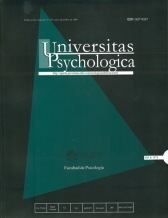Resumen
Se presenta una adaptación a la población chilena de la escala de racismo moderno de McConahay, Hardee y Batts (1981), de la que se estudian sus propiedades psicométricas (fiabilidad y validez) y su relación con otras variables psicosociales relevantes en los estudios sobre prejuicio y discriminación étnica (autoritarismo, religiosidad, posición política, etc.), así como su relación con otras formas de prejuicio (estereotipos de género y homofobia). La muestra quedó compuesta por 120 sujetos, estudiantes de la carrera de psicología, residentes en la ciudad de Antofagasta (una zona geográfica con alta recepción de inmigrantes provenientes de otros países latinoamericanos). Los análisis realizados muestran que la escala parece ser un instrumento fiable para medir el prejuicio hacia los inmigrantes bolivianos en nuestro entorno social. Asimismo, se detectan importantes diferencias entre los sujetos con puntajes altos y bajos en la escala, en las variables psicosociales utilizadas.Esta revista científica se encuentra registrada bajo la licencia Creative Commons Reconocimiento 4.0 Internacional. Por lo tanto, esta obra se puede reproducir, distribuir y comunicar públicamente en formato digital, siempre que se reconozca el nombre de los autores y a la Pontificia Universidad Javeriana. Se permite citar, adaptar, transformar, autoarchivar, republicar y crear a partir del material, para cualquier finalidad (incluso comercial), siempre que se reconozca adecuadamente la autoría, se proporcione un enlace a la obra original y se indique si se han realizado cambios. La Pontificia Universidad Javeriana no retiene los derechos sobre las obras publicadas y los contenidos son responsabilidad exclusiva de los autores, quienes conservan sus derechos morales, intelectuales, de privacidad y publicidad. El aval sobre la intervención de la obra (revisión, corrección de estilo, traducción, diagramación) y su posterior divulgación se otorga mediante una licencia de uso y no a través de una cesión de derechos, lo que representa que la revista y la Pontificia Universidad Javeriana se eximen de cualquier responsabilidad que se pueda derivar de una mala práctica ética por parte de los autores. En consecuencia de la protección brindada por la licencia de uso, la revista no se encuentra en la obligación de publicar retractaciones o modificar la información ya publicada, a no ser que la errata surja del proceso de gestión editorial. La publicación de contenidos en esta revista no representa regalías para los contribuyentes.


